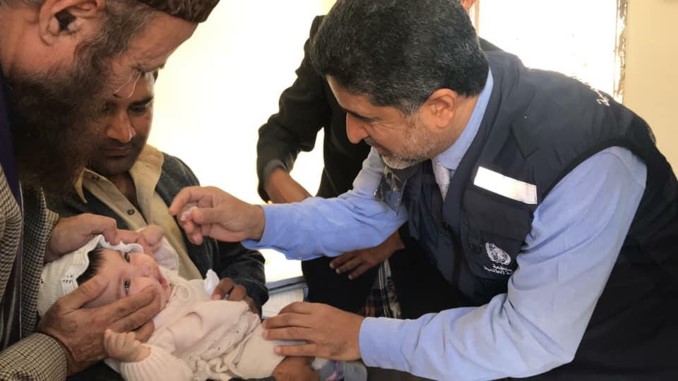
When we last convened, it was a very different world. The COVID-19 pandemic was hitting its early stride, and the polio programme in our Region had just stepped forward bravely to meet this new public health challenge, working alongside national health programmes and, in countries with limited or weakened health infrastructure, stepping into the breach.
In the intervening months, I observed as the polio programme in some of the most complex countries in this Region – Pakistan, Afghanistan, and others – paused their polio eradication activities and applied their considerable skills to the COVID-19 pandemic.
1243 staff were engaged in COVID-19 response. Polio’s contact tracing systems, surveillance networks and workforce were rapidly deployed in a chaotic, fast-changing operating environment to identify COVID-19 cases, their contacts, surveil for symptoms and roll out waves of testing and health education. What was apparent to me in the mid-year months was that the investments we have made in polio eradication are actually investments in broader public health infrastructure and pandemic response.
Unfortunately, COVID-19 exacted a heavy toll on the polio programme. More than 200 of our polio personnel have been infected since the start of the pandemic, and three of them lost their lives due to COVID-19.
The pandemic cost us the opportunity to vaccinate 50 million children. Meanwhile both wild and vaccine-derived polioviruses spread unchecked. In July, polio vaccination campaigns re-started, with vaccinators equipped with PPE and using no- and low-contact techniques. We have successfully carried out large-scale campaigns in Pakistan, Afghanistan, Syria and parts of Yemen since the restart. Polio workers across the region are to be commended for the speed at which they trained on new COVID-era techniques and behaviours, and their successful and ongoing resumption of campaigns.
We celebrated the certification of African Region as free of wild poliovirus and are redoubling our own efforts as the last remaining polio endemic Region. Now is the time to be shoring up the polio programme and mobilizing funding, including domestic funds, so that this remarkable public health and pandemic response mechanism can remain robust and can be integrated into broader public health services across the region. Now is the time for full regional solidarity and mobilization.
I am pleased to report that the Regional Committee reaffirmed its commitment in a resolution to complete wild poliovirus eradication and polio transition. The Member States resolved to stop all cVDPV outbreaks and prepare for the introduction of the novel OPV type 2. I am also particularly pleased by the commitment of Ministers of Health in our region to bring their own wisdom, influence and authorities in the newly established Regional Sub-Committee for Polio Eradication and Outbreaks. Moreover, I have given polio transition my close attention, establishing and chairing the Regional Steering Committee on Polio Transition. The committee has been working towards adapting our polio transition strategies and coordinating with priority Member States in the evolving context of COVID-19. The contribution of the polio programme to the pandemic has highlighted the added value and feasibility of cross-programmatic integration, with the setting up of integrated public health teams in priority countries in the region. It is very important for us to move ahead in implementing polio transition strategies, to strengthen national immunization programmes and support country readiness for the introduction and equitable distribution of COVID-19 vaccines, as well as strengthen emergency preparedness and response, and health systems.
Listen to Dr Al-Mandhari’s statement, presented in the fourth meeting of Committee A, Item 11 (Pillar 1)




